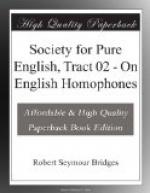But in Tyndal’s gospel we read
Why seest thou a mote in thy brother’s
eye and perceivest not
the beam that is in thine own eye?
The word beam is especially awkward here,[3] because the beam that is proper to the eye is not the kind of beam which is intended. The absurdity is not excused by our familiarity, which Shakespeare submitted to, though he omits the incriminating eye:
You found his mote; the king your mote
did see,
But I a beam do find in each of three.
[Footnote 3: It is probable that in Tyndal’s time the awkwardness was not so glaring: for ‘beam’ as a ray of light seems to have developed its connexion with the eye since his date, in spite of his proverbial use of it in the other sense.]
And yet just before he had written
So sweet a kiss the golden sun gives not
To those fresh morning drops upon the
rose,
As thy eye-beams when their fresh rays
have smote
The night of dew that on my cheeks down
flows.
Let alone the complication that mote is also a homophone, and that outside Gulliver’s travels one might as little expect to find a house-beam as a castle-moat in a man’s eye, the confusion of beam is indefensible, and the example will serve three purposes: first to show how different significations of the same word may make practical homophones, secondly the radical mischief of all homophones, and thirdly our insensibility towards an absurdity which is familiar: but the absurdity is no less where we are accustomed to it than where it is unfamiliar and shocks us.
[Sidenote: Tolerance due to habit.]
And we are so accustomed to homophones in English that they do not much offend us; we do not imagine their non-existence, and most people are probably unaware of their inconvenience. It might seem that to be perpetually burdened by an inconvenience must be the surest way of realizing it, but through habituation our practice is no doubt full of unconscious devices for avoiding these ambiguities: moreover, inconveniences to which we are born are very lightly taken: many persons have grown up to manhood blind of one eye without being aware of their disability; and others who have no sense of smell or who cannot hear high sounds do not miss the sense that they lack; and so I think it may be with us and our homophones.
But since if all words were alike in sound there would be no spoken language, the differentiation of the sound of words is of the essence of speech, and it follows that the more homophones there are in any language, the more faulty is that language as a scientific and convenient vehicle of speech. This will be illustrated in due course: the actual condition of English with respect to homophones must be understood and appreciated before the nature of their growth and the possible means of their mitigation will seem practical questions.
[Sidenote: Great number.]




